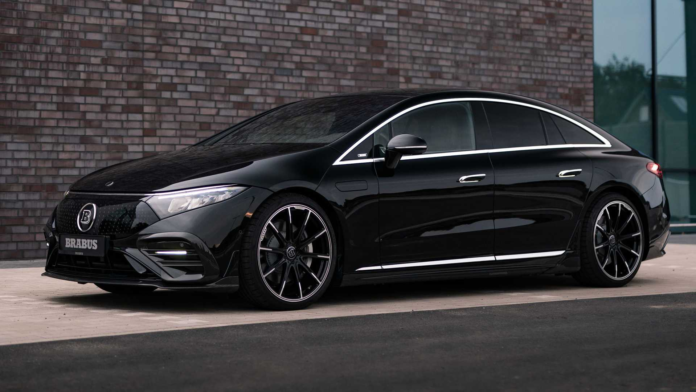Some claim that since aftermarket specialists won’t be able to modify combustion engines after the inevitable transition to electric vehicles, the future isn’t too promising for tuners. Brabus is modifying Mercedes’ top-of-the-line electric car to show how a tuning company can survive in the EV era, even though it’s true that a significant portion of their business will be destroyed by the demise of the ICE.
To further enhance the sleekness of the zero-emissions liftback, the EQS 450 has received an aerodynamic body kit that was developed in a wind tunnel. It already had the lowest drag coefficient among production cars with a Cd of 0.20, but Brabus has created an even more aerodynamic shape to reduce the Cd by 7.2% in comparison to the standard car.
Every component of the custom body is made of carbon and has a glossy or matte finish. The air deflector components in front of the rear wheel arches to improve airflow are an example of an addition. While the rear features a diffuser to lessen aerodynamic lift, the front receives a new front spoiler lip. When the car is moving between 62 and 87 mph (100 and 140 km/h), the aero improvements help to increase range by 7%.
The adoption of Monoblock wheels, which are available in sizes ranging from 20 to 22 inches and have been specifically modified for the EQS, is by far the most noticeable change. The 22-inch set with 255/35 ZR22 front and 295/30 ZR22 rear tyres is shown in adjacent images of the top-of-the-line Mercedes EV in the wind tunnel. The EQS has been adjusted to sit 15 millimetres (0.6 inches) closer to the road in the front and 20 millimetres (0.8 inches) closer to the road in the back.
There are numerous ways to customise the interior, from various leathers to a velour trunk mat, as you might anticipate from a Brabus project. The Bottrop-based specialist offers carbon or aluminium pedals as well as scuff plates with the business’s illuminated logo.









